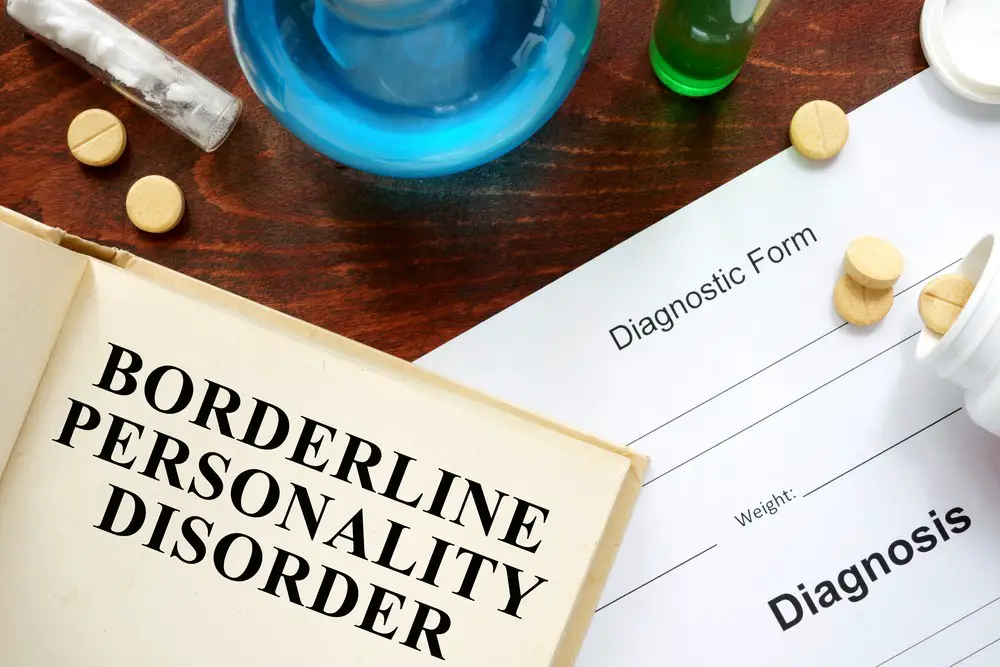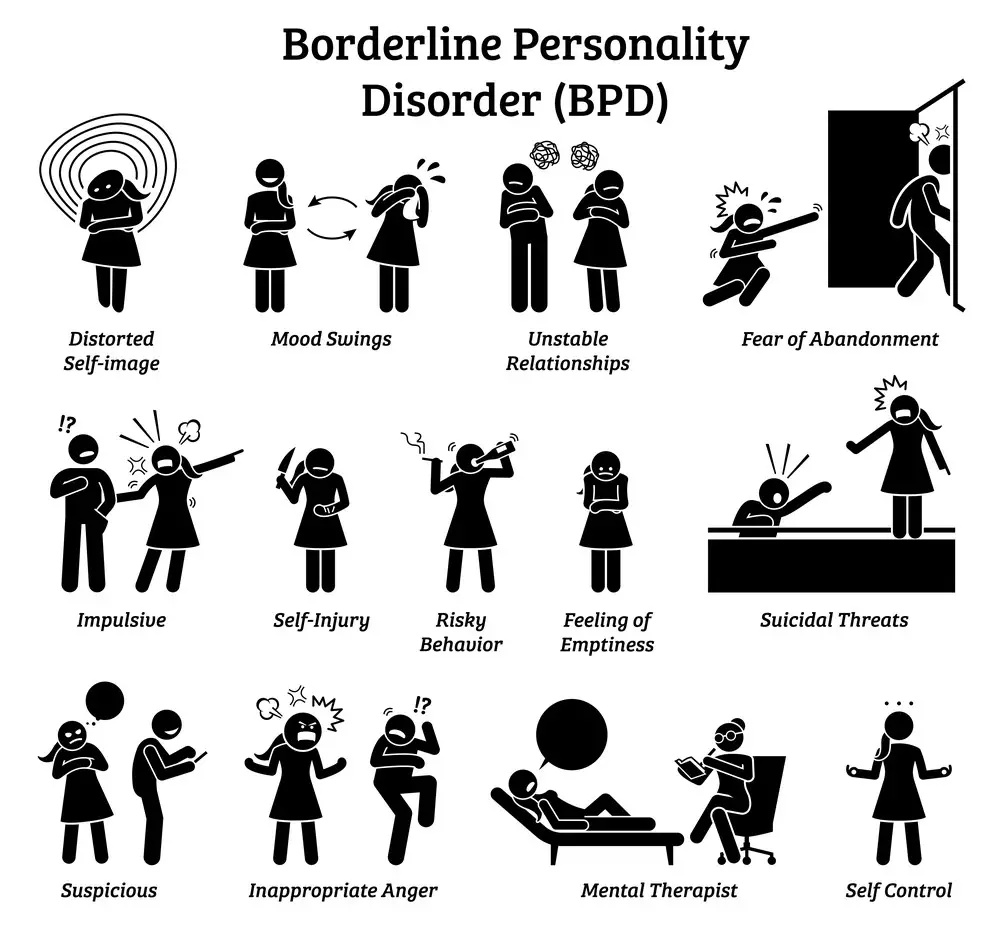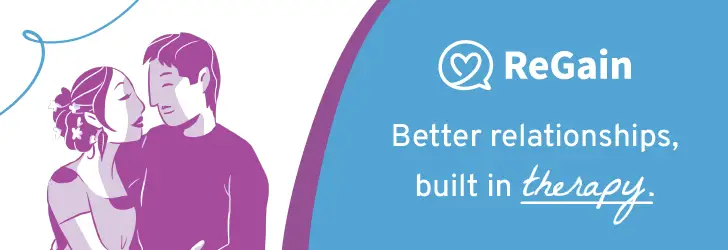As a BetterHelp affiliate, we receive compensation from BetterHelp if you purchase products or services through the links provided
Entering the world of dating can be challenging, but when your partner has borderline personality disorder (BPD), the experience can be particularly difficult. Navigating a relationship’s complexities with someone with BPD can lead to emotional distress, confusion, and trauma. In this article, we delve into the intricacies of dating a person with BPD and explore the potential trauma that may arise from such a relationship.
A borderline personality disorder is a mental health condition characterized by intense emotional instability, poor self-image, and impulsive behavior. It can manifest in a person’s relationships through fear of abandonment, intense emotional reactions, and frequent mood swings, which often make it challenging to maintain a healthy connection. When dating someone with BPD, it’s crucial to recognize the potential challenges and be prepared to address the emotional turbulence that may arise.
To better understand the impact of BPD on relationships and the trauma that can result from dating someone with this condition, we will explore common symptoms, underlying emotional turmoil, potential manipulative tactics, and the challenges faced within a BPD relationship. Additionally, we will discuss therapy and support options, self-care strategies, and tips for overcoming the damage caused by such relationships.
Key Takeaways
- Relationships with someone with borderline personality disorder can be challenging and may lead to emotional trauma.
- BPD can cause intense emotional instability, fear of abandonment, and frequent mood swings within relationships.
- Addressing the challenges of a BPD relationship and pursuing therapy, support, and self-care strategies can help individuals overcome the trauma and heal.
 Understanding Borderline Personality Disorder
Understanding Borderline Personality Disorder
Borderline Personality Disorder (BPD) is a mental health condition that affects how you think, feel, and relate to yourself and others. It is characterized by unstable emotions, impulsive behaviors, and difficulty maintaining relationships.
According to the DSM-5, a person with BPD exhibits at least five of the following symptoms:
- Intense fear of abandonment and frantic efforts to avoid it
- Unstable and intense interpersonal relationships
- Unstable self-image or sense of self
- Impulsive behaviors that can be harmful (e.g., substance abuse, overspending)
- Recurrent suicidal or self-harming behavior
- Intense mood swings and inappropriate, intense anger
- Chronic feelings of emptiness
- Difficulty controlling anger
- Temporary stress-related paranoia or disassociation
BPD is a complex mental health disorder whose root causes are not fully understood. However, researchers believe genetic, neurological, environmental, and psychological factors contribute to its development. It is crucial to remember that everyone’s experience with BPD is different and that the severity of symptoms can vary from person to person.
If you think you or someone you care about may have BPD, seeking professional help from a mental health provider is essential. A psychologist or psychiatrist can diagnose the condition and work with you to develop a personalized treatment plan that may include therapy, medication, and support from loved ones. By understanding BPD and seeking appropriate help, you can take steps towards improving your mental well-being and relationships.
 Dating Someone with BPD
Dating Someone with BPD
When you are dating someone with Borderline Personality Disorder (BPD), it can be a rollercoaster ride of emotions. Relationships can be intense and passionate but also filled with ups and downs, making it challenging. BPD is a complex mental health condition that affects people differently, so let’s explore some aspects of dating someone with BPD.
Managing emotional swings: BPD can cause rapid mood swings, leaving you feeling like you’re walking on eggshells. One moment, your partner may shower you with love and affection; the next, they might become distant or angry. You must learn how to navigate these emotional waters without getting swept away. Practicing mindfulness and maintaining your emotional stability is key in supporting your partner.
Setting boundaries: Boundaries are essential in any relationship, but they’re even more important with a BPD partner. Establishing clear expectations and boundaries—such as how much time you spend together, managing social media interactions, and defining personal limits—can protect your well-being and create a healthier romantic relationship.
Dealing with episodes of insecurity: People with BPD often fear abandonment, which can cause jealousy, possessiveness, or overly needy behavior. Remember, reassuring your partner of your commitment and love for them when they’re feeling insecure is crucial. Maintain open communication to help mitigate these fears and anxieties.
Getting professional support: Dealing with BPD in a relationship can be challenging for both partners. Seeking therapy or support groups to help navigate this journey is essential. A mental health professional can provide coping strategies and relationship guidance, becoming an invaluable resource in your partnership.
In summary, dating someone with BPD requires understanding, patience, and effective communication. Establishing clear boundaries, managing emotions, and seeking professional support can foster a healthier and more loving romantic relationship. Remember, it’s crucial to prioritize self-care and maintain your well-being throughout the journey.
Common Symptoms in Relationships
You may encounter various challenges when dating someone with Borderline Personality Disorder (BPD). Here are some common symptoms that you might face:
- Fear of abandonment: Your partner might fear that you’ll leave them, which can lead to clinginess, jealous behavior, or attempts to control and manipulate you.
- Trust issues: Trust can be hard to establish and maintain in relationships with BPD individuals. They might suspect you of being unfaithful or question your intentions, even if you’re honest and loyal.
- Impulsive behavior: Your partner may exhibit sudden changes in behavior, such as reckless spending or engaging in risky activities. This impulsivity can make it difficult to predict or rely on their actions.
- Anger: Intense, irrational anger is a common symptom of BPD. Your partner might be angry over minor issues or directing their rage towards themselves or others.
- Boundaries: Establishing healthy boundaries can be difficult in relationships with someone with BPD. Your partner might test your limits and manipulate you into bending or breaking your boundaries.
- Mood swings: Rapid and extreme mood swings are hallmark symptoms of BPD. Your partner’s mood can change drastically within hours or even minutes, making maintaining emotional stability in your relationship challenging.
- Instability: Relationships with someone with BPD can be a rollercoaster of emotions, with their instability often affecting your emotional well-being. It’s important to take care of yourself and seek support when needed.
- Idealization and devaluation: Your partner might go through phases of idealizing you and placing you on a pedestal, only to suddenly devalue and criticize you. This pattern can be exhausting and confusing.
- Unstable self-image: People with BPD often have an unstable self-image, which can lead them to change their goals, values, or even appearance constantly. This instability can make understanding your partner’s true needs and desires difficult.
Remember that having a relationship with someone with BPD can be challenging, but understanding and recognizing these common symptoms can help you better navigate your relationship and seek appropriate support.
Underlying Emotional Turmoil
Dating someone with Borderline Personality Disorder (BPD) can be an intense experience owing to the emotional turmoil faced by your partner. They may struggle with chronic feelings of emptiness and have difficulty regulating their emotions. So, let’s explore some common emotional challenges faced in such relationships.
Anxiety: When dating someone with BPD, you may notice heightened anxiety in various situations. They might require constant reassurance and fear abandonment. This anxiety not only affects them but can also impact their relationship and emotional well-being.
Depression: In many cases, individuals with BPD experience bouts of depression. It can manifest as lethargy, social withdrawal, or even feelings of hopelessness. Being empathetic and supportive of your partner during their low periods can be essential to navigating the relationship.
Regulating Emotions: People with BPD often struggle to regulate their emotions, which might lead to mood swings and impulsive reactions. This emotional rollercoaster can be overwhelming for both partners in the relationship. Practicing patience and healthy communication can help manage such situations.
- Emotional Turmoil: As your partner navigates through their emotional highs and lows, you might be caught in the turbulence. Striking a balance between being supportive and caring for your emotional needs is crucial for a healthy relationship.
- Chronic Feelings of Emptiness: A person with BPD might constantly feel a sense of emptiness, which can influence their behaviors and emotional state. As a result, they might seek validation or attempt to fill the void with intense emotions. Understanding the root cause of their actions can help address and cope with this issue.
In conclusion, dating someone with BPD comes with unique challenges stemming from the underlying emotional turmoil. By developing empathy, understanding, and effective communication skills, you can better navigate the complexities of such a relationship and foster a caring and supportive environment for you and your partner.
 Potential Manipulative Tactics
Potential Manipulative Tactics
You might encounter manipulative tactics when dating someone with borderline personality disorder (BPD). These tactics can help you navigate the relationship and maintain your mental well-being.
One common tactic is gaslighting, where the person with BPD may distort your perception of reality by making you question your memories, feelings, or experiences. This could lead to feelings of confusion and self-doubt. For example, they might say things like “You’re too sensitive” or “You’re imagining things.”
Lying is another manipulative behavior that can occur. This could be lying about their thoughts, feelings, past behaviors, or events. For instance, they may create stories or exaggerate situations to evoke your sympathy or emotional response.
People with BPD may also engage in self-harming behaviors or make threats of self-harm or suicide as a way to manipulate you. This might be done to prevent you from leaving or to gain emotional control over you. While these threats are manipulative, they should still be taken seriously, and proper help should be given to the person with BPD.
Some other manipulative tactics to be aware of include:
- Playing the victim involves portraying themselves as the victim to gain sympathy or control.
- Belittling and undermining: They might undermine your accomplishments, intelligence, or appearance to make you feel inferior.
- Silent treatment: Avoiding communication, giving the “silent treatment,” or displaying passive-aggressive behaviors could be their way of punishing you or gaining control.
- Triangulation: Creating drama or conflict between you and another person, often by sharing your weaknesses or negative perceptions of you with the other party.
By understanding these potential manipulative tactics, you can better protect yourself emotionally and seek appropriate support when needed. Remember, maintaining a healthy relationship is a mutual responsibility, and you deserve a partner who respects your boundaries and emotions.
Challenges in a BPD Relationship
Dating someone with borderline personality disorder (BPD) can present unique challenges in a relationship. Unstable emotions, fears of abandonment, unstable relationships, and impulsive behavior mark BPD. It can be tough to navigate this terrain, but understanding the challenges can help you cope and find ways to support your loved one.
One of the main challenges in a BPD relationship is the ever-present fear of abandonment. People with BPD often worry that their partner will leave them, leading to feelings of insecurity and an intense need for reassurance and validation. You must remain patient and provide constant reassurance, even when it feels repetitive.
Closely linked to fears of abandonment are unstable relationships. Due to emotional turbulence, people with BPD may cause sudden shifts in the relationship’s stability. One moment, they may express intense love and affection, while the next, they might push their partner away. This can be jarring, so try to remain grounded and avoid being swept away by the emotional highs and lows.
Splitting, a term used to describe the tendency to see things as good or bad, is also common in BPD relationships. Your loved one may struggle to maintain a balanced perspective on relationship issues, resulting in impulsively ending the relationship instead of working through problems. Navigating these episodes may require keeping calm and maintaining perspective, even when their actions seem irrational.
Rage can be another issue in BPD relationships. People with BPD may have difficulty controlling their anger, leading to outbursts that may feel disproportionate to the situation. Remember that their anger is often driven by fear and hurt. Practice listening empathetically and try to validate their feelings without justifying the aggression.
As partners of someone with BPD, your role is often to provide emotional support, validate their feelings, and help maintain stability in the relationship. This can be difficult, as those with BPD can be sensitive, and even the smallest perceived slight may trigger their insecurities. Remember to be gentle and compassionate, and consistently remind them of your love.
Remember that no relationship is obstacle-free, and supporting a partner with BPD can be genuinely fulfilling. Understanding these challenges and remaining steadfast in your love can build a strong, stable, loving relationship with your partner.
 Move beyond pain and confusion together.
Move beyond pain and confusion together.
Dealing with Trauma
Experiencing trauma from a relationship with someone with Borderline Personality Disorder (BPD) can affect you in many ways. Recognizing and addressing those effects is important to heal and move forward. Here are a few tips to help you navigate this challenging process.
First, acknowledge that the trauma you experienced is real and valid. Although the person with BPD may not have intended to cause harm, their behavior can still have lasting effects on those around them. Remember that it’s okay to feel hurt and that recognizing this pain is the first step in healing.
Next, practice self-care. In the aftermath of emotional distress, it’s crucial to prioritize your well-being. Things like:
- Eating well and staying hydrated
- Exercising regularly
- Spending time with loved ones and
- Pursuing hobbies and interests that bring you joy
These simple steps can help improve your mood and overall mental health.
To better understand and process your feelings, consider seeking professional help. Therapy and support groups can provide valuable insight into your experiences, as well as offer coping strategies for dealing with trauma-related symptoms, such as:
- PTSD
- Flashbacks
- Nightmares
- Panic attacks, and
- Emotional turmoil
Moreover, try to maintain a sense of routine in your daily life. Consistency helps create a sense of stability and security, which is essential for healing from traumatic experiences. Set achievable goals and try to stick to them as much as possible.
Lastly, but importantly, be patient with yourself. Recovering from trauma can be a long and challenging journey. Remember that setbacks are normal, and sometimes, it might feel like progress is slow. Trust in your strength and resilience, and know you can overcome the obstacles that trauma presents with time and support.
Therapy and Support Options
When coping with trauma from dating someone with BPD, finding the right support and therapy options tailored to your needs is essential. Remember, you’re not alone, and healing is possible.
Dialectical Behavior Therapy (DBT) is a popular choice for individuals dealing with emotional turmoil from BPD relationships. Developed by psychologist Marsha Linehan, DBT is designed to help you learn how to regulate emotions better, improve relationships, and cope with stress. DBT can help you navigate difficult emotions and situations more effectively by teaching practical skills and techniques.
In addition to DBT, consider seeking professional support through individual counseling with a licensed therapist or psychologist. A psychotherapist can provide deeper insight into your thoughts, emotions, and behavior and help you devise personalized coping strategies. They’ll also support you every step of the way as you begin to heal.
Remember, establishing a reliable support network is crucial. Find friends or family members who understand what you’re going through so you can share your experiences with them. Support groups, both in-person and online, are valuable for connecting with others who have faced similar challenges. Sharing your story and listening to others can help you feel less isolated and more empowered.
Lastly, you must equip yourself with coping strategies that resonate with you. Some examples might include:
- Journaling to express and process your thoughts and emotions.
- Engaging in relaxation techniques, such as deep breathing or meditation.
- Pursuing hobbies or activities that bring you joy and comfort.
- Practicing self-care by setting aside time to care for your physical, emotional, and mental well-being.
Exploring various therapy options, professional support, and a strong support network will lead you toward healing. Remember to be patient with yourself—a recovery cannot happen overnight. Still, with dedication and the right tools, you can overcome the trauma of dating someone with BPD.
 Self-Care Strategies
Self-Care Strategies
When dating someone with borderline personality disorder (BPD), it’s essential to prioritize your self-care. Practicing self-care can help you maintain emotional well-being and personal growth, even when facing the challenges of dating someone with BPD.
Empathy and patience are crucial when dealing with your partner’s emotional fluctuations. Try to put yourself in their shoes and understand the root of their feelings. Listening to their emotions and validating their experiences can help build trust and understanding. However, it is important to set your limits and not get overwhelmed by your partner’s emotions.
Educate yourself about BPD to better understand the disorder and gain insights into your partner’s behaviors. The more you know, the easier it is to navigate the relationship with empathy and knowledge. Numerous books, websites, and online forums can provide valuable information.
Make time for personal growth by reflecting on your experiences within the relationship. Consider keeping a journal to explore your thoughts and feelings and identify patterns or areas of improvement. Engaging in activities that foster personal growth, like meditation, exercise, or taking up a new hobby, can help you stay balanced and emotionally healthy.
Your emotional well-being should remain a top priority. Surround yourself with a strong support system of friends, family, or mental health professionals who can provide guidance and encouragement. Don’t hesitate to seek therapy for yourself if necessary. This can be an invaluable tool for maintaining your mental health and well-being.
Incorporate these self-care strategies into your daily life:
- Set boundaries: Communicate your needs and limits to your partner.
- Practice self-compassion: Remember that you deserve love and kindness like anyone else.
- Schedule regular self-care activities: Carve out time for hobbies, exercise, and relaxation.
- Stay connected with your support system: Keep in touch with friends and family for emotional support and reassurance.
Remember, when dating someone with BPD, it’s essential to prioritize your well-being, emotions, and growth. By actively practicing self-care and empathy, you and your partner can navigate the ups and downs of a relationship.
Overcoming the Damage
It’s natural to experience trauma after dating someone with BPD, but the healing process is within your grasp. To rebuild your self-esteem and self-worth and take back your life, follow these steps:
- Acknowledge the pain: Accept that you’ve been hurt and allow yourself to feel every emotion that comes with it. This helps in recognizing the damage and sets the stage for healing.
- Find a strong support system: Surround yourself with people who lift you up, such as friends, family, or counselors. Share your experiences, and don’t be afraid to ask for help. Talking with others who have had similar experiences can also be impactful.
- Practice self-compassion: Be gentle with yourself during this vulnerable time. Remind yourself that it’s okay to feel hurt and that you deserve to heal. Practice self-care and set aside time for activities that make you feel relaxed and nurtured.
- Rediscover your passions: Regain your sense of self-worth by reigniting the spark for the things you love. Delve into hobbies, interests, or activities that make you feel alive and passionate.
- Implement positive affirmations: Boost your self-esteem by repeating empowering statements to yourself each day. Examples include “I am worthy of love” or “I am enough.” Write them down and place them where you can see them regularly.
- Set boundaries: Learning to set and maintain healthy boundaries will empower you in future relationships. Understand your limits and communicate them clearly without feeling guilty.
- Forgive yourself: Remember that it’s not your fault. You can’t control another person’s behavior or actions. Accept that you did your best, and allow yourself to move forward.
Healing from trauma is an ongoing process, so don’t rush yourself. Take it one day at a time, and remember that there’s light at the end of the tunnel. By following these steps, you’re well on your way to overcoming the damage and embracing a brighter future.
Conclusion
In conclusion, dating someone with borderline personality disorder (BPD) can bring unforgettable moments and difficult challenges to your relationship. You must maintain open communication, set boundaries, and practice self-care to build a healthy bond with your partner.
Remember that it’s not your responsibility to “fix” your partner or their disorder. Supporting them in seeking professional help can provide a stable foundation for your relationship. You and your partner can both benefit from participating in therapy, whether it’s individual or couples counseling.
Lastly, stay educated on the topic of BPD. Your understanding and empathy for your partner’s condition will go a long way in nurturing the resilience and trust between you. Navigating the complexities of this relationship may not always be easy, but with determination and effort, you can create a supportive and loving partnership.
Frequently Asked Questions
What are common signs of trauma after a BPD relationship?
- Intrusive thoughts or memories of the relationship
- Avoidance of triggers related to the relationship
- Negative beliefs about oneself or others
- Changes in mood, such as irritability, anxiety, or depression
- Hypervigilance or feeling on edge
- Sleep disturbances
How to cope with PTSD from a BPD relationship?
- Seek professional help from a therapist or counselor
- Build a support network of friends, family, or support groups
- Practice self-care, including regular exercise, a balanced diet, and sufficient sleep
- Develop healthy coping mechanisms, such as journaling or mindfulness
- Establish boundaries and communicate your needs in new relationships
What are the challenges of dating after a borderline relationship?
- Trust issues with new partners
- Fear of emotional vulnerability
- Difficulty recognizing and establishing healthy boundaries
- Residual trauma triggers that can affect intimacy
- A tendency to attract or be attracted to unhealthy partners
How to identify and break a trauma bond with someone with BPD?
- Recognize the signs of a trauma bond, such as feeling powerless or trapped in the relationship.
- Set boundaries and enforce them consistently
- Seek professional help or attend support groups for guidance
- Foster self-compassion and self-worth through self-care and affirmations
- Create physical and emotional distance from the person with BPD
What are the risks of getting involved with someone with borderline personality disorder?
- Emotional instability and mood swings
- Impulsive and risky behavior
- Intense and unstable relationships
- Identity disturbance and low self-esteem
- Threats of suicide or self-harm
How can one detach themselves from a person with borderline personality disorder?
- Understand and accept that you cannot change or fix the person
- Establish clear and healthy boundaries for yourself
- Practice self-care and prioritize your emotional well-being
- Seek professional help and guidance to navigate the process
- Minimize contact and interactions with the person, if possible
About Jacob Maslow: Navigating Emotional Trauma in Relationships ?️
Surviving Catastrophe: From 9-11 to BetterHelp ??
Hey there! I’m Jacob Maslow, a 9-11 survivor who once worked on the 101st floor and lost over a thousand coworkers in that tragic event. I’m not a stranger to trauma or loss, and BetterHelp has been a game-changer as I navigate my ongoing emotional journey. I’m an affiliate and a satisfied user, helping me wade through the tumultuous waters of life.
Dad at Home: The Blissful Days ????
Once upon a time, I was the primary caregiver for our kids while my ex worked full-time, often through the night. Our children lived in two households but maintained a close relationship with both of us. But oh, how the tables have turned.
Narcissistic Woes: The Alienation Spiral ??
Over the past year, my ex severed all ties between me and our kids, even refusing to adhere to court-ordered shared custody. As her beauty fades, her narcissistic tendencies seem to intensify. I’ve been through the emotional wringer dealing with her antics, from community leader affairs to vicious smear campaigns.
Mental Health Toolkit: Lexapro & Therapy ??
I’m on Lexapro to manage my mental health and have recently joined BetterHelp. Therapy isn’t new to me; I’m a veteran. Despite the current nightmares, I have faith in healing and moving forward.
Daily Coping: Long Walks & Writing ?♂️?
My coping mechanism? Long walks. Every. Single. Day. Also, I channel my energy into writing articles to help others who are going through their narcissistic nightmares or other mental health challenges.
Legal Aid: Breaking the Cycle of Non-compliance ?⚖️
I also run a legal site to assist those dealing with a spouse who refuses to honor court orders or co-parent responsibly. The experience of losing a once-close relationship with my children has taken a toll, but I’m committed to helping others in similar straits.
Final Thoughts: Anyone Can Triumph ??
I believe in the resilience of the human spirit. Regardless of what life throws at you, emotional well-being is possible. I’m proof you can navigate the dark clouds and find your sunshine again.
So, join me on this journey. Whether you’re dealing with trauma, a narcissistic ex, or other mental health challenges, remember: You’re not alone, and healing is within reach.
- 3 Ways Wearing a Hat Can Help Lower Your Stress Levels - April 19, 2025
- Breaking the Silence: Why Men’s Mental Health Matters More Than Ever - April 15, 2025
- How to Transform a Home’s Patio Space into a Relaxing Space - March 23, 2025
This site contains affiliate links to products. We will receive a commission for purchases made through these links.


 Understanding Borderline Personality Disorder
Understanding Borderline Personality Disorder Dating Someone with BPD
Dating Someone with BPD Potential Manipulative Tactics
Potential Manipulative Tactics Self-Care Strategies
Self-Care Strategies

